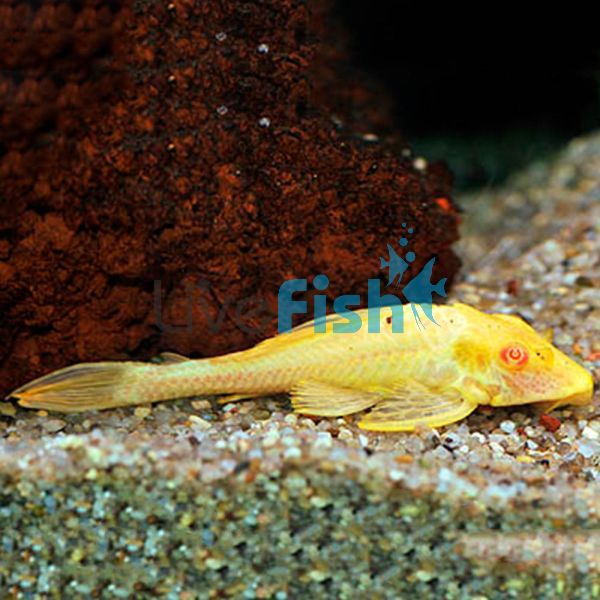Albino Sailfin Plecostomus 4cm
For the aquarists who are looking to enter the monster fish would the sailfin or gibbiceps pleco this is an incredibly easy to care for and unique looking armored catfish which reaches monstrous sizes. Sailfin plecos generally range from a dark brown to even black colour however the albino sailfin pleco is the complete opposite to this. Bred specifically to showcase the albino gene these plecos have a ghostly look to them with a body colour ranging from cream to yellow and stark red eyes coupled with the bony skeleton-like bone plating it makes them a very unique fish to have in an aquarium. This dense bone plating they have means even aggressive aquarium species would have a difficult time causing damage to the sailfin pleco.
Albino Sailfin Pleco
For the aquarists who are looking to enter the monster fish would the sailfin or gibbiceps pleco this is an incredibly easy to care for and unique looking armoured catfish which reaches monstrous sizes. The sailfin pleco is one of the larger pleco species as they reach around 40 cm making them a great addition to South American predator fish aquariums.
Sailfin plecos generally range from a dark brown to even black colour however the albino sailfin pleco is the complete opposite to this. Bred specifically to showcase the albino gene these plecos have a ghostly look to them with a body colour ranging from cream to yellow and stark red eyes coupled with the bony skeleton-like bone plating it makes them a very unique fish to have in an aquarium. This dense bone plating they have means even aggressive aquarium species would have a difficult time causing damage to the sailfin pleco.
Plecos are often regarded as cleaner fish and though species like the Bristle nose are great at eating algae the sailfin plecos tend to be more carnivorous in nature and largely contribute to the bioload in an aquarium. Breeding the albino sailfin pleco in the home aquarium is a very difficult task due to the fact they are not sexually dimorphic and also have very specific breeding requirements which can often only be achieved in a pond like an environment. The wild habitat of the sailfin pleco is South America.
Tank Recommendations for your albino sailfin pleco
Being a large growing pleco species the sailfin pleco does need a fairly large aquarium but is easy to care for species of fish. Because of their large size, it is best to keep them in a tank that is a minimum of around 380 litres. They also appreciate aquariums with lots of wood and cave-like structures as sailfin plecos tend to be more nocturnal in nature. They also are not fussy about substrate types and can be kept in a sand or gravel substrate but also thrive in a bare bottom environment as well. being a South American fish, they do prefer softer water conditions ranging from the 6.5 - 7 mark.
Suitable Tank Buddies
The albino sailfish pleco is fairly peaceful in nature and does not actively hunt fish however to stick to the safer side, nano aquarium fish should be avoided along with slow-moving or flat-bodied fish such as discus or stingrays. This is because there have been instances where sailfish plecos can rasp on the slime coat and skin of these fish causing extreme damage and even death. They are however suitable with a wide range of larger growing fish species.
Usually Compatible
Large growing South American fish such as Oscars, peacock bass, dovii, jaguar cichlids and similar species
Sometimes Compatible
Medium growing and top dwelling community fish such as giant danios, silver dollars, keyhole cichlids, acaras and kissing gouramis
Rarely Compatible
Small and slow swimming species such as neon tetras, discus, freshwater stingrays, lungfish and freshwater sole
Feeding your albino sailfish pleco
The albino sailfish pleco is very easy to feed and will accept a wide range of foods. due to their bottom-dwelling nature, they prefer to eat sinking foods and can be fed things like sinking pleco wafers. But they can also eat an all-around carnivore's cichlid pellet as well as fresh foods such as thawed fish pieces, prawns and similar foods. Feeding should happen once during the day preferably when the lights are off.
| Scientific Name | Glyptoperichthys gibbiceps |
|---|---|
| Common Names | Sailfin pleco, gibbiceps pleco, sailfish gibbiceps, gibbi pleco |
| Diet | Omnivore |
| Fish Family | Loricariidae |
| Lifespan (years) | 15 |
| Max. Length (cm) | 40 |
| Min. Tank Volume (l) | 380 |
| Origin | South America |
| Reef Safe | Yes |
| Sociability | Peaceful |
| Venomous | No |
| Water Conditions | 24-26° C (75.2-79° F), pH 6.5-7.0 |




